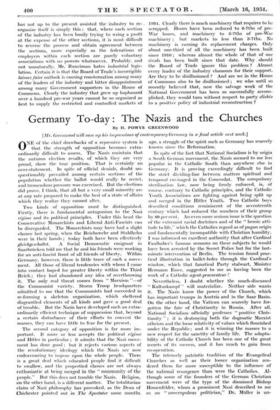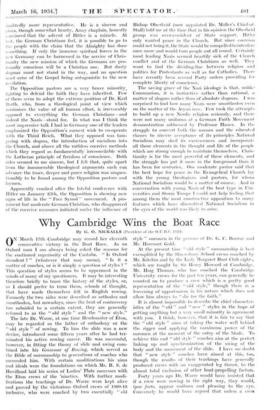Germany To-day : The Nazis and the Churches
By H. POWYS GREENWOOD
[Mr. Greenwood will sum up his impressions of contemporary Germany in a final article neat week.] ONE of the chief drawbacks of a repressive system is that the strength of opposition becomes extra- ordinarily difficult to assess. The Nazis maintain that the autumn election results, of which they are very proud, show the true position. That is certainly an over-statement. In spite of official denials, doubt un- questionably prevailed among certain sections of the population whether the ballot would really be secret, and tremendous pressure was exercised. But the elections did prove, I think, that all but a very small minority are at any rate prepared to make the best of a state of affairs which they realize they cannot alter.
Two kinds of opposition must be distinguished. Firstly, there is fundamental antagonism to the Nazi regime and its political principles. Under this head the Conservative Monarchists and Liberal Anti-Fascists can be disregarded. The Monarchists may have had a slight chance last spring, when the Reiehswehr and Stahlhelm were in their hands ; today both have been effectively gleichgeschaltet. A Social Democratic emigrant in Saarbrucken told me that he and his friends were working for an anti-fascist front of all friends of liberty. Within Germany, however, there is little trace of such a move- ment. All those of liberal tendencies with whom I came into contact hoped for greater liberty within the Third Reich ; they had abandoned any idea of overthrowing it. The only real threat comes from " Marxism "—of the Communist variety. Storm Troop headquarters admitted to me that the Communists had succeeded in re-forming a skeleton organization, which sheltered disgruntled elements of all kinds and gave a good deal of trouble. But the Nazis have developed such an extra- ordinarily efficient technique of suppression that, beyond a certain disturbance of their efforts to convert the masses, they can have little to fear for the present.
The second category of opposition is far more im- portant. It more or less accepts the political regime and Hitler in particular ; it admits that the Nazi move- ment has done good : but it rejects various aspects of the revolutionary ideology which the Nazis are now endeavouring to impose upon the whole people. There is a great deal which educated people find it difficult to swallow, and the propertied classes are not always enthusiastic at being merged in the " community of the people." But this does not trouble the Nazis. Religion, on the other hand, is a different matter. The totalitarian claim of Nazi philosophy has provoked, as the Dean of Chichester pointed out in The Spectator some months. ago, a struggle of the spirit such as Germany has scarcely known since the Reformation.
In spite of the fact that National Socialism is by origin a South German movement, the Nazis seemed to me less popular in the Catholic South than anywhere else in Germany. It is proving exceedingly difficult to find the strict dividing-line between matters spiritual and temporal envisaged in the Concordat. The compulsory sterilization law, now being firmly enforced, is, of course, contrary to Catholic principles, and the Catholic Youth Associations are fighting against being split up and merged in the Hitler Youth. Two Catholic boys described conditions reminiscent of the seventeenth century which had reduced the numbers of their group by 80 per cent. An even more serious issue is the question of the extremist racial doctrines and of the " heroic atti- tude to life," which the Catholics regard as of pagan origin and fundamentally incompatible with Christian humility. I was informed on excellent authority that after Cardinal Faulhaber's famous sermons on these subjects he would have been arrested by the Secret Police but for the last- minute intervention of Berlin. The tension found prac- tical illustration in bullet-holes through the Cardinal's window, which that fanatical Party stalwart, Minister Hermann Esser, suggested to me as having been the work of a Catholic agent-provocateur !
Nevertheless, I doubt whether the much-discussed " Kulturkampf " will materialize. Neither side wants it. The Nazis know the power of the Church, which has important trumps in Austria and in the Saar Basin. On the other hand, the Vatican can scarcely have for- gotten the fate of Christianity in Russia. After all, National Socialism officially professes " positive Chris= tianity " ; it is destroying both the dogmatic Marxist atheism and the loose relativity of values which flourished under the Republic; and it is winning the masses to a new respect for the sanctity of family life. The adapta- bility of the Catholic Church has been one of the great secrets of its success, and it has much to gain from co--operation.
The intensely patriotic tradition of the Evangelical Churches as well as their looser organization ren- dered them far more susceptible to the influence of the national resurgence than were the Catholics. Al- though some of the founders of the German Christian movement were of the type of the dismissed Bishop Hossenfelder, whom a prominent Nazi described to me as an " unscrupulous politician," Dr. Mailer is un- doubtedlY more repreSentative. He is a sincere and pious, though somewhat hearty,- Army chaplain, honestly convinced that the advent of Hitler is a miracle. At last, the 'German- Christians feel; it is possible to go to the people with the claim. that the Almighty haS done' something. • If only the immense spiritual forces in the new Germany can be harnessed in the service of Chris-. tianity the:new mission- of which the Germans are pro- foundly conscious will be a Christian one. But dusty dogmas must not stand in the way, and no question must arise of the. Gospel- being antagonistic to the new revelation.
The Opposition pastors are a very brave minority, fighting to defend the faith they have inherited. Few of them seem to adopt the extreme position of Dr. Karl Barth, who, from a theological point of view which minimizes the value of all human effort, is irrevocably opposed to everything the German Christians—and indeed the Nazis.—stand for. In what was I think the most impressive talk I had in Germany one of the leaders emphasized the Opposition's earnest wish to co-operate with the Third Reich. What they opposed was tam- pering with dogma, the introduction of racialism into the Church, and above all the ruthless coercive methods which they regard as fundamentally :irreconcilable with the Lutheran principle of freedom of conscience. Both sides seemed to me sincere, but I felt that, quite apart from the innumerable theological arguments each can advance the truer, deeper and purer religion was unques- tionably to be found among the Opposition pastors and laymen.
Apparently crushed after the fateful conference with Hitler on January 25th, the Opposition is showing new signs of life in the " Free Synod " movement. A pro- minent but moderate German Christian, who disapproved of the coercive measures initiated under the influence of Bishop Oberheid (now appointed Dr. Miller's Chief-of- Staff) told me at the time that in his opinion the Oberheid group was over-confident of • State support. Hitler only wanted peace in the Church. But since coercion could not bring it, the State would be compelled to interfere once more and would turn people out all round. Certainly most leading Nazis seemed heartily sick of the Church conflict and of the German Christians as well. They want to find the dividing-line between religion and politics for Protestants as well as for Catholics. There have recently been several Party orders providing for complete liberty of conscience. • • • The saving grace of the Nazi ideology is that, unlike Communism, it is instinctive rather. than rational, a matter of slogans rather than of absolute dogmas. I was surprised to find how mans- Nazis were unorthodox even on the matter of the Aryan race. Few took the attempts to build up a new Nordic religion seriously, and there were not many uniforms at a German Faith Movement demonstration addressed by Professor Hauer. In the struggle to convert both the masses and the educated classes to sincere acceptance of its principles National Socialism may shed its excrescences and incorporate all those elements in the thought and life of the people which are strong enough to maintain themselves. Chris- tianity is far the most powerful.-of these elements, and the struggle has put it more in the foreground than it has been for centuries. One moderate pastor said that the best hope for peace in the Evangelical Church lay with the young theologians and pastors, for whom National Socialism would be a matter of course. And in conversation with young Nazis of the best type in Uni- versities and Storm Troops I could not help feeling that among them the most constructive opposition to ninny features which have discredited National Socialism in the eves of the world was likrly fo arise.











































 Previous page
Previous page